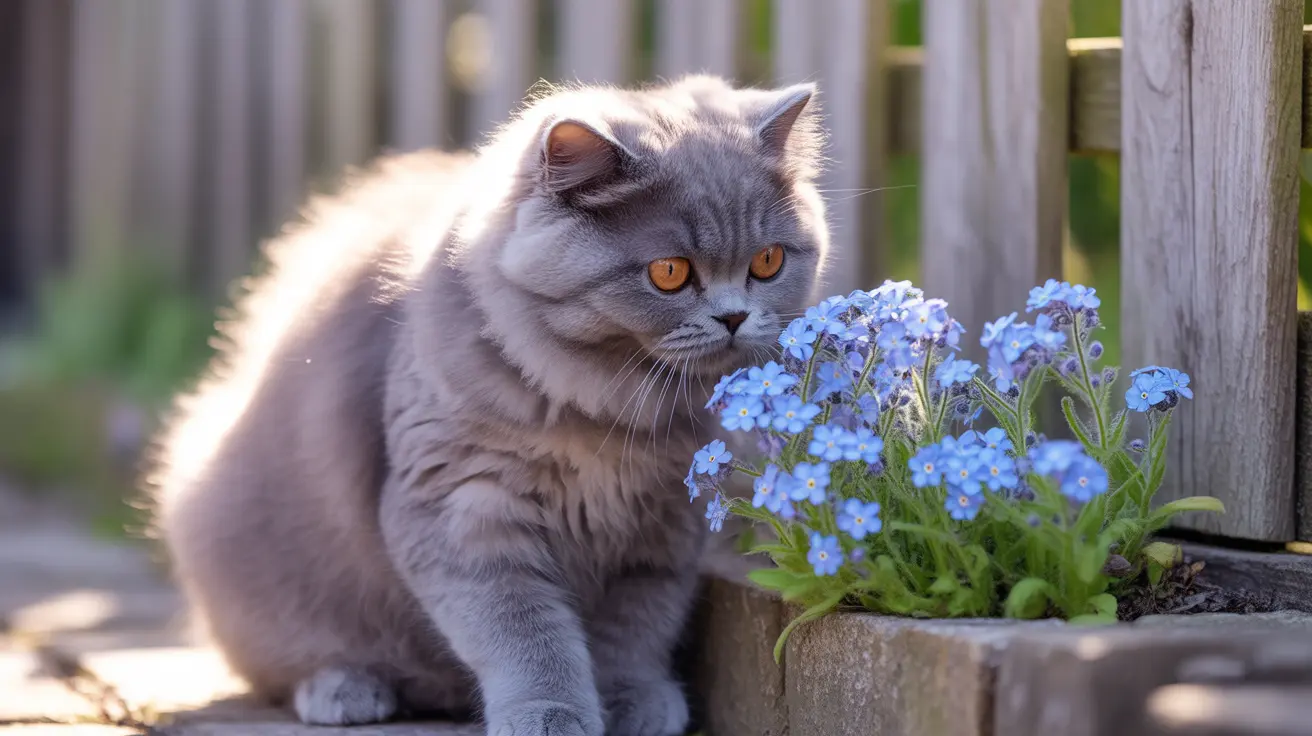As a cat owner, you're right to be concerned about the safety of plants in and around your home. Forget-me-nots, with their delicate blue flowers, are a popular garden choice - but are they safe for your feline friends? Let's explore everything you need to know about forget-me-nots and cat safety.
The good news is that true forget-me-nots (Myosotis species) are generally considered non-toxic to cats. However, there are some important distinctions and precautions you should understand to keep your pets safe.
Understanding Different Types of Forget-Me-Nots
Not all plants called "forget-me-nots" are created equal when it comes to cat safety. True forget-me-nots (Myosotis sylvatica and related species) are safe for cats, but other plants using the same common name can be dangerous:
- True Forget-Me-Nots (Myosotis species): Non-toxic to cats
- Chinese Forget-Me-Not (Cynoglossum amabile): Potentially toxic
- Hound's Tongue (Cynoglossum officinale): Toxic
Safety Considerations for Cat Owners
Even though true forget-me-nots aren't poisonous, it's still important to exercise caution:
- Keep plants out of easy reach
- Monitor your cat's plant-eating behavior
- Be aware that any plant material can cause mild stomach upset
- Ensure proper identification before bringing new plants home
Signs of Plant-Related Issues
While true forget-me-nots aren't toxic, watch for these symptoms if your cat consumes any plant:
- Vomiting or diarrhea
- Excessive drooling
- Lethargy or unusual behavior
- Loss of appetite
Creating a Cat-Safe Garden Environment
To maintain a beautiful garden while protecting your cats:
- Choose confirmed non-toxic plants
- Use barriers or deterrent sprays
- Provide alternative cat-friendly plants like cat grass
- Keep a list of safe and unsafe plants
Safe Alternatives for Cat Owners
Consider these pet-safe alternatives to satisfy your cat's plant-chewing instincts:
- Cat grass
- Catnip
- Spider plants
- Pet-safe herbs like basil or rosemary
Frequently Asked Questions
Are forget-me-nots poisonous to cats, and is it safe to have them indoors or in the garden?
True forget-me-nots (Myosotis species) are non-toxic to cats and safe for both indoor and outdoor gardens. However, always ensure proper plant identification and monitor your cat's interaction with any plants.
How can I tell the difference between toxic and non-toxic forget-me-not plants for my cat's safety?
Check the botanical name: Myosotis species are safe, while Cynoglossum species (Chinese forget-me-not or Hound's tongue) are potentially toxic. Consult a garden center expert or botanist if unsure.
What symptoms should I watch for if my cat eats forget-me-nots or other similar plants?
While true forget-me-nots are non-toxic, watch for vomiting, diarrhea, drooling, or unusual behavior. These symptoms might indicate plant material irritation or consumption of a toxic look-alike.
What precautions can I take to protect my cat from potentially toxic plants like Chinese forget-me-nots?
Keep all plants out of easy reach, use deterrent sprays, provide alternative cat-friendly plants, and maintain a barrier between cats and potentially harmful plants.
Are there safer alternative plants I can grow at home that won't harm my cat if they chew on them?
Yes! Consider cat grass, catnip, spider plants, and certain herbs like basil or rosemary. These plants are safe for cats and can satisfy their natural urge to chew on greenery.
Conclusion
While true forget-me-nots are safe for cats, responsible pet ownership means staying informed about plant safety and taking appropriate precautions. By understanding the differences between various forget-me-not species and implementing proper safety measures, you can create a beautiful garden that's safe for your feline friends.






